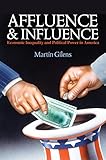Affluence and Influence : Economic Inequality and Political Power in America / Martin Gilens.
Material type: TextPublisher: Princeton, NJ : Princeton University Press, [2012]Copyright date: ©2012Description: 1 online resource (352 p.) : 9 halftones. 34 line illus. 55 tablesContent type:
TextPublisher: Princeton, NJ : Princeton University Press, [2012]Copyright date: ©2012Description: 1 online resource (352 p.) : 9 halftones. 34 line illus. 55 tablesContent type: - 9780691162423
- 9781400844821
- 320.60973 23
- online - DeGruyter
- Issued also in print.
| Item type | Current library | Call number | URL | Status | Notes | Barcode | |
|---|---|---|---|---|---|---|---|
 eBook
eBook
|
Biblioteca "Angelicum" Pont. Univ. S.Tommaso d'Aquino Nuvola online | online - DeGruyter (Browse shelf(Opens below)) | Online access | Not for loan (Accesso limitato) | Accesso per gli utenti autorizzati / Access for authorized users | (dgr)9781400844821 |
Frontmatter -- Contents -- List of Tables -- List of Figures -- Acknowledgments -- Introduction -- Chapter 1. Citizen Competence and Democratic Decision Making -- Chapter 2. Data and Methods -- Chapter 3. The Preference/Policy Link -- Chapter 4. Policy Domains and Democratic Responsiveness -- Chapter 5. Interest Groups and Democratic Responsiveness -- Chapter 6. Parties, Elections, and Democratic Responsiveness -- Chapter 7. Democratic Responsiveness across Time -- Chapter 8. Money and American Politics -- Appendix -- Notes -- References -- Index
restricted access online access with authorization star
http://purl.org/coar/access_right/c_16ec
Can a country be a democracy if its government only responds to the preferences of the rich? In an ideal democracy, all citizens should have equal influence on government policy--but as this book demonstrates, America's policymakers respond almost exclusively to the preferences of the economically advantaged. Affluence and Influence definitively explores how political inequality in the United States has evolved over the last several decades and how this growing disparity has been shaped by interest groups, parties, and elections. With sharp analysis and an impressive range of data, Martin Gilens looks at thousands of proposed policy changes, and the degree of support for each among poor, middle-class, and affluent Americans. His findings are staggering: when preferences of low- or middle-income Americans diverge from those of the affluent, there is virtually no relationship between policy outcomes and the desires of less advantaged groups. In contrast, affluent Americans' preferences exhibit a substantial relationship with policy outcomes whether their preferences are shared by lower-income groups or not. Gilens shows that representational inequality is spread widely across different policy domains and time periods. Yet Gilens also shows that under specific circumstances the preferences of the middle class and, to a lesser extent, the poor, do seem to matter. In particular, impending elections--especially presidential elections--and an even partisan division in Congress mitigate representational inequality and boost responsiveness to the preferences of the broader public. At a time when economic and political inequality in the United States only continues to rise, Affluence and Influence raises important questions about whether American democracy is truly responding to the needs of all its citizens.
Issued also in print.
Mode of access: Internet via World Wide Web.
In English.
Description based on online resource; title from PDF title page (publisher's Web site, viewed 30. Aug 2021)


